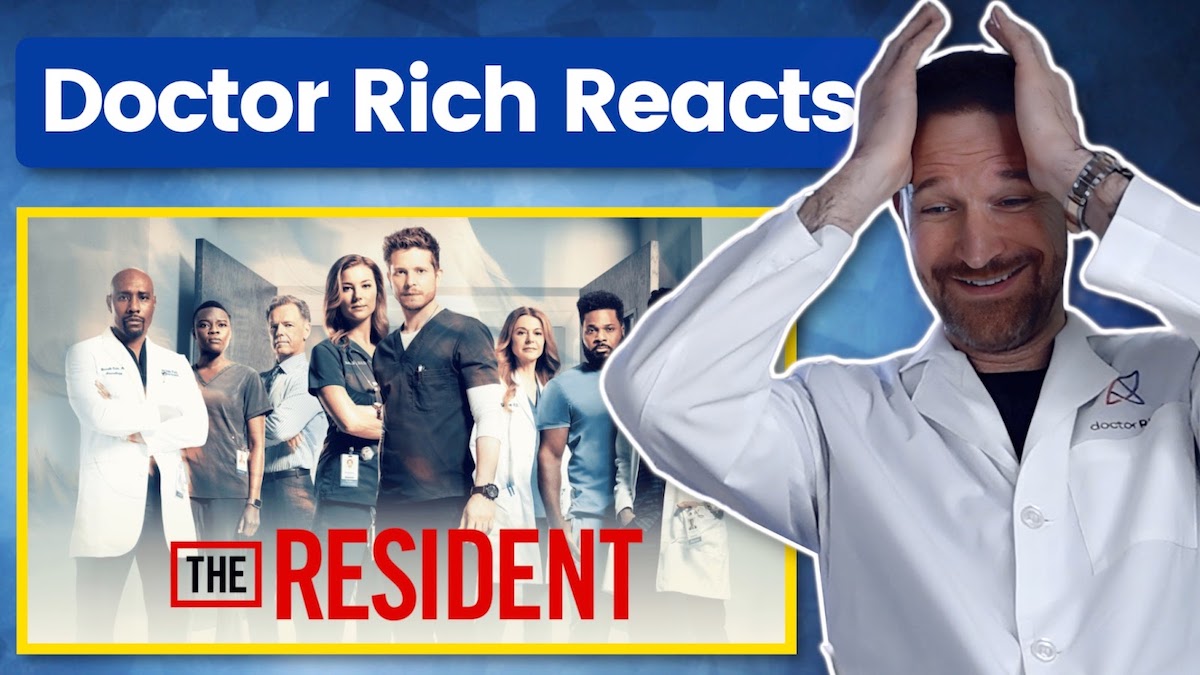Can a doctor fall asleep at work?
Hi, I’m Doctor Rich: gynecologist and robotic surgeon. Let’s check out this episode of The Resident. If you’re a doctor in training, you need to watch this video. But before we dive in… if you like content like this, join our community, become a subscriber, and turn on your notifications.
Don’t have time to read this post? Watch the video here instead!
[Episode from the TV show The Resident begins. A tired-looking doctor is ending his shift and talking with a nurse practitioner at the nurses’ station.]
Dr. Jenkins:
Free at last!
Nic Nevin:
Finally get to go home, Bradley.
Dr. Jenkins:
Yes. I can’t wait to get home and take a long, hot shower and then sleep, followed by more sleep.
Doctor Rich:
So there’s an adage in residency surgical training that you never eat when you can sleep… and you never sleep when you can be in the operating room. And it’s kind of a mantra and also somewhat the butt of the joke that surgeons never want to be anywhere except in the OR doing surgery.
Nic:
You’re not driving, are you?
Dr. Jenkins [sees Dr. Bell walking towards him]:
Oh, hell no…
Dr. Bell:
Bradley, I’ll need you in one of my surgeries later this afternoon.
Nic:
Wait, wait, he just completed a 30-hour shift!
Dr. Bell [annoyed]:
I’m sorry… Bradley, do you need to go home and rest?
Dr. Jenkins:
No, no, sir. Dr. Bell, I… uh… [Dr. Bell walks away before Dr. Jenkins is finished speaking.]
Doctor Rich:
A 30-hour shift? That sounds crazy, but it’s actually not farfetched. In my residency training, the longest shift I had was about 36 hours. That means that you get up on a Monday at 6:00 AM, you go to work, you work all day until 6:00 PM, then everybody else goes home, but you’re on call. So in a busy OB/GYN residency program, there are babies being delivered, there’s emergency surgeries, and C-sections. And so you’re basically up all night. So 6:00 PM to 6:00 AM, you’re at 24 hours, and you didn’t get the post-call day off. So you start out at 6:00 AM the next day as if it’s just another work day, even though you just literally worked 24 hours. And then you get to work all that day until 6:00 PM, and then you finally get to go home. And this poor soul is expressing, “I want to sleep, I want to dream about sleeping, and then I want to sleep some more.”
[In the video, Dr. Bell is walking down the hall with Dr. Okafor and Dr. Jenkins.]
Dr. Bell:
So once timeout has concluded and surgery begins in OR one, you’ll take over and I’ll return to two.
Dr. Okafor:
Great.
Dr. Bell [to Dr. Jenkins, who is yawning]:
Sorry, Bradley, am I boring you?
Dr. Bell:
No, of course not. I was just wondering what the plan is in the event of complications. Well, I’ll be there to ensure everything goes smoothly.
[Dr. Bell zones out for a second, with dramatic music playing in the background.]
Dr. Okafor:
You okay, Dr. Bell?
Dr. Bell:
Yeah, I’m fine… [Dr. Bell looks at Dr. Jenkins, who seems zoned out as well. He snaps his fingers in Dr. Jenkins’ face.] Wake up!
Dr. Jenkins:
Yes, sir.
Doctor Rich:
So now that’s foreshadowing!
So before you start thinking that the world is full of surgeons at the 29th hour of a 30-hour shift, that’s usually not the case — even in residency training. This started in the early 2000s with the Bell Commission in New York and has spread nationally where they’ve limited work hours. So there’s a work hour restriction to 80 hours per week maximum for resident doctors in training (which still sounds like a lot — and in truth, it probably is).
There’s a bit of a division between the “old guard” and the “new guard.” So the old guard incorrectly feels, “Well since I had to work this many hours in a row, you should too. And that’s the only way to be a good doctor!” But studies have shown when you work to the point of exhaustion, you are actually more dangerous behind the wheel of a car than you are if you’re drunk.
So clearly there’s poor decision-making that happens at the point of extreme exhaustion. Now, the old guard would suggest you only have so many hours in a four-year or five-year residency to see absolutely every possible surgical situation/complication/presentation that you need to be prepared for in order to be a doctor that’s prepared for anything. But the truth is that we have a lifelong commitment to learning. And yes, we need to get most of that experience done during residency training, but there’s better ways to go about that than making people work 36 hours in a row.
[In the OR, Drs. Jenkins and Bell are operating on a patient.]
Dr. Bell:
Good work, Bradley.
Dr. Jenkins:
Thank you, sir.
Dr. Bell [Coaching Jenkins as he operates. Operatic classical music plays in the background.]:
Hold that steady. There you go…
Dr. Jenkins:
Love the choice of music, by the way. Very soothing.
Dr. Bell:
Well, thank you. I want you to know I never just randomly select residents for my surgeries. Handpicked a very specific criteria…
[Dr. Jenkins passes out from exhaustion mid-surgery. Chaos erupts in the OR.]
Dr. Bell:
Oh my God. Sharon, get Dr. Okafer!
Nurse Sharon:
Yes, doctor!
Dr. Bell [putting gauze on the hemorrhaging patient]:
Just keep it coming!
Doctor Rich:
And there you have it.
So I had something happen somewhat similar in my residency training. I was at the end of the shift that I was talking about earlier. I was standing up talking to a patient in labor and delivery triage, asking her about her symptoms. And as I was writing it down, I actually nodded off and was about to fall over. The patient grabbed me and said, “Are you all right?” And I said, “Yep. Just one hour away from finishing my shift.” So clearly in a more high-stakes scenario, like we see in this episode of The Resident, major complications can happen.
So to put everybody’s mind at ease (and for the residents): There are restrictive work hours now, and you should never be put in a situation where you feel too tired to perform at your optimal level. Now, there’s probably going to be some time in your residency where you see a one-in-a-million case — and that might be worth staying up to watch. Otherwise, you should never be bullied into working past the hours that are required by your program and the ACGME (Accreditation Council for Graduate Medical Education).
A call out to the residents: So over my career, I’ve trained hundreds of doctors, residents, medical students, and attending physicians on robotic surgery. And for the women’s health practitioners and trainees, we’ve got all the content that you need, from pseudocyesis to endometriosis and prolapse surgery. Subscribe now!




